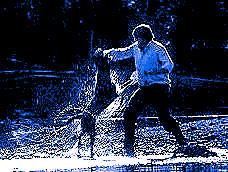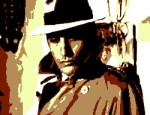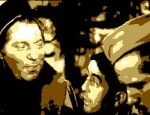Film Review

There are two sequences in the film that are particularly chilling, and both have intensely sinister sexual connotations. In the first, the main villain of the piece Morel (a visibly deranged dog breeder played with terrifying conviction by Gérard Depardieu) is seen happily splashing about in a river with his treasured Belgian sheepdog. Filmed in slow motion in diffuse sunlight, the sequence looks like an over-the-top love scene of the kind you would expect to find in the tackiest of romantic melodramas. Morel caresses and fondles his dog as if she were his mistress, repeatedly calls her "beautiful" and even refers to her as a prostitute. Later, Morel's strange perversion is given a far more sickening hue in the scene in which he takes an obvious delight in being attacked by the dogs he is training. "More! More!" he cries, deriving an unmistakable sexual thrill from the canine aggression he is arousing. What makes this scene so particularly disturbing is how Morel's bestial form of sadomasochism is transferred to another person, the seemingly well-adjusted teacher Élisabeth. The latter becomes complicit in what is clearly intended as a grotesque parody of the sex act between two wild animals, and the look of exultation that settles on her face as the scene reaches its climax is one that can hardly fail to freeze the blood. It is the expression of someone who has allowed her primitive bestial impulses to take over and eradicate all trace of humanity, leaving a fully fledged bigot smiling in exultation at her release from moral restraint. We have just witnessed the birth of a fascist.
What happens next is an anti-climax and the film never quite lives up to its initial promise. There is a disturbing hunt sequence in which the dog owners pursue a delinquent through the woods and drive him to a nasty death - a stark prediction of where society will end up if fear takes over to the extent that individuals end up forming armies to purge their communities of those who are not to their liking. But after this, the narrative becomes mechanical and everything is wrapped up a little too tidly. The mysterious rapist is exposed and punished, the diabolical dog breeder gets his just desserts and order is restored to a model community (it is left to the spectator to decide whether the fascists have taken over). In common with most of Jessua's output, Les Chiens is far less impressive as a film than it is as a thoughtfully provocative piece of commentary on the way our society may be heading. (Its apparent failings are more easy to forgive if you regard it as a black comedy rather than as a serious thriller.) More than three decades after it was made, the film continues to be scarily pertinent. Indeed, with concerns over immigration and mistrust of immigrants becoming a national obsession throughout the developed world, you can easily believe that the apocalyptic scenario of Les Chiens is already being played out in several communities across Europe. Fear makes dogs of us all.
© James Travers 2014
The above content is owned by frenchfilms.org and must not be copied.
Film Synopsis
Not long after arriving in a small provincial town, a young doctor, Henri Ferret, is struck by the mood of fear that pervades the region. Several of his patients, including a schoolteacher named Élisabeth, have been violently assaulted, and their reaction is to join the increasing number of people who have acquired dogs to protect them. The man who benefits most from this worrying trend is Morel, who not only breeds dogs for a living but also trains them to attack possible aggressors. When the mayor, Boursault, tries to take action against Morel, he is savagely attacked by a dog, making the popular dog breeder a likely replacement for his position. Concerned with the way the town is heading, Ferret decides he must act...© James Travers
The above content is owned by frenchfilms.org and must not be copied.
Similar Films
Here are some other films you may enjoy watching:- L'Été meurtrier (1983)
- Si j'étais un espion (1967)
- Nikita (1990)
- Seven Days to Noon (1950)
- Crime d'amour (2010)
Other related links:
Film Credits
- Director: Alain Jessua
- Script: Alain Jessua, André Ruellan
- Cinematographer: Étienne Becker
- Music: René Koering, Michel Portal
- Cast: Gérard Depardieu (Morel), Victor Lanoux (Docteur Henri Ferret), Nicole Calfan (Elisabeth), Pierre Vernier (Gauthier), Fanny Ardant (L'infirmière), Philippe Klébert (Franck), Régis Porte (Jacques), Gérard Séty (Le maire), Philippe Mareuil (Beauchamp), Henri Labussière (Montagnac), Anna Gaylor (Madame Colin), Elisabeth Kaza (La première invitée), Monique Morisi (La seconde invitée), Maurice Illouz (Le patron disco), Betty Beckers (La femme parking), Pierre Londiche (Casteret), Jean-François Dérec (Le premier client disco), Gérard Caillaud (Commissaire Laborde), Denyse Roland (Brigitte), Marc Chpill (Le proviseur)
- Country: France
- Language: French
- Support: Color
- Runtime: 95 min
- Aka: The Dogs
The very best French thrillers

The Golden Age of French cinema

The greatest French Films of all time
